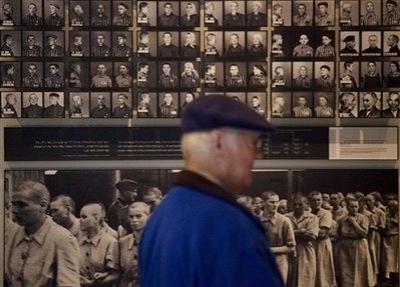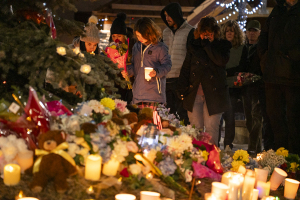No, the Holocaust is not just one of many tragic events of human history

According to a tone-deaf editorial published on Holocaust Remembrance Day in the Kentucky Courier Journal, “Jews do not have a monopoly on persecution and atrocities,” and “Hitler was just one of many dictators.” Accordingly, “International Holocaust Day is not just a mantra about one Jewish holocaust, but about every genocide, every mass tyranny that is carried out upon any group based on skin color, religion, gender identity and ethnic background. We must not forget, nor suppress, the truths of all those crimes that happened and are still happening.”
No wonder that Noam Blum commented on Twitter, “Brain addled progressives cannot ever condemn antisemitism without burying it in a mountain of general identity grievance.”
On a practical level, this would be like saying after the murder of George Floyd, “This is not the time to focus on the issue of police brutality, since brutality occurs in all kinds of settings around the world every day.”
Or, when teaching children about the harsh realities of the American slave trade, we say, “African Americans do not have a monopoly on being enslaved. Many people from many other backgrounds have been enslaved as well.”
Who would tolerate such nonsense?
It is right and fitting to commemorate the singular sufferings of particular people or nations, just as it is right and fitting to commemorate the singular accomplishments of particular people or nations.
This is beyond obvious — unless, rather than celebrate the legacy of Martin Luther King, Jr., we simply remember all those who stood up for justice. Or, rather than celebrate the American Revolution on July 4th, we celebrate all freedom movements in history. Or, rather than remember the Armenian Genocide, we simply remember lots of people who faced ethnic cleansing through history.
Who on earth thinks this way?
But when it comes to the Jews and the Holocaust, how dare we draw specific attention to this horrific event. After all, other innocent people died in World War II, let alone in other wars. And other people have been hated and despised as ethnic and religious minorities. As for Hitler, he’s just another run of the mill, dime a dozen bad guy. Nothing special there. Why all the fuss?
The editorial actually claims that “For one group, for one person, to claim that the hate and violence towards them is more important than another’s, only encourages more acts of violence against others, including Black people, Asians, Hispanics, Muslims, LGBTQ+, trans-gender and Native Americans. This list is not all-inclusive.”
Seriously? If we emphasize the horrors of Jewish suffering under the Holocaust without mentioning all these other groups, this will encourage more violence against them? This is beyond nonsensical.
The reality is that there are three crucial reasons that the Holocaust must be remembered.
First, it is a unique evil among historic world evils, and Hitler was a uniquely evil leader.
How many other historic events involved the intentional mass execution of 6 million people in cold blood, representing two-thirds of Europe’s 9 million Jews? And how many other historic events involved the murderous, meticulous, and systematic collaboration of several nations?
How many people groups saw the extermination of 90% of their population, as happened in Poland, where Jews had lived for more than 1,000 years and where 3 million out of Poland’s 3.3 million Jews were slaughtered? And shall I mention that among the 6 million were 1.5 million children and babies?
Second, as monstrous as the Holocaust was, there have been systematic attempts to deny (or, at the least, minimize) its existence, right until this very moment. In certain countries (in particular Islamic or Communist), generations of children have grown up without any real knowledge of the Holocaust, other than it is a Zionist myth or the like.
As for other countries, Holocaust ignorance abounds. A 2019 survey in the UK found that, “Five per cent of UK adults do not believe the Holocaust took place and one in 12 believes its scale has been exaggerated, a survey has found.”
A 2020 article from the Pew Research Center stated that, “Most U.S. adults know what the Holocaust was and approximately when it happened, but fewer than half can correctly answer multiple-choice questions about the number of Jews who were murdered or the way Adolf Hitler came to power, according to a new Pew Research Center survey.”
Even back in 2014, an article in The Atlantic reported that, “A new survey suggests that many Asians, Africans, Middle Easterners, young people, Muslims, and Hindus believe that facts about the genocide have been distorted.”
And this ignorance exists despite the mountains of photographs, videos, artifacts, and eyewitness accounts, even from eyewitnesses still alive today.
If we do not actively keep the memory of the Holocaust alive, with each passing year, its unspeakable atrocities will be sanitized or erased.
Third, antisemitism is on the rise today, including acts of both verbal and physical violence. As noted on Yahoo News October 28, 2022, “an audit by the Anti-Defamation League published this past April found that incidences of antisemitism ‘reached an all-time high in the United States in 2021, with a total of 2,717 incidents of assault, harassment, and vandalism reported.’ According to the ADL, this was the highest number of incidents reported in over 40 years, averaging out to nearly seven per day. It also marked a 34% increase from 2020.”
In countries like France, it was noted already in 2016 that, “Jews are leaving France in record numbers amid rising anti-Semitism and fears of more Isis-inspired terror attacks.”
And in the ultimate rebuke to the Courier Journal editorial, a Muslim terrorist killed 7 Jews in Jerusalem as they left their synagogue on the very evening of Holocaust Remembrance Day. And, according to the Jerusalem Post, “the Hamas and Palestinian Islamic Jihad terrorist groups praised Friday’s attack.”
No, the Holocaust is not just one of many tragic events which have taken place in human history, nor does remembering the Holocaust take away from the memory of other tragedies, some of which were also unspeakably evil.
Instead, it is essential that we keep the memory of the Holocaust alive because the unique hatred that inspired it is alive and well and thriving today.
Dr. Michael Brown(www.askdrbrown.org) is the host of the nationally syndicated Line of Fire radio program. His latest book is Revival Or We Die: A Great Awakening Is Our Only Hope. Connect with him on Facebook, Twitter, or YouTube.



























